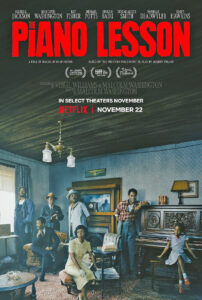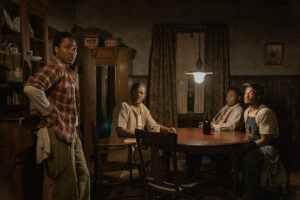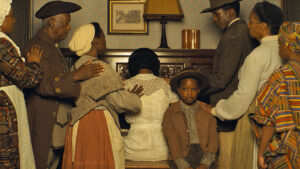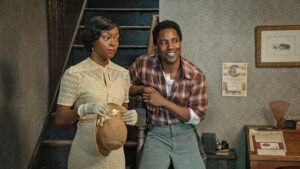 By Steve Crum
By Steve Crum
It was less than a delightful experience viewing The Piano Lesson. Based upon August Wilson’s Broadway play of the same name and directed-adapted by Malcolm Washington, The Piano Lesson is a study in family values and characterizations. Its strength is in the superb acting, supported by rich dialogue.
It is an ensemble piece, par excellence.

Umbrage has to be taken, however, with expectations. Specifically, TPL is advertised as a “drama”—which is valid. From the outset, the story “presents realistic characters who deal with realistic conflicts or struggles.” (Thank you, Mr. Webster.)
However, exploding during the third act of this 127-minute tale is a supernatural aspect best described as “horror.” Ghostly, violent things occur. It all pertains to the family and friends inside the house, which is the primary setting. So why isn’t The Piano Lesson truthfully promoted as drama/horror? A petty observation? I don’t think so.
Consider the plot line, which Virgil Williams co-adapted. Utilizing flashbacks to tell the history of the piano that centers the story, the tale opens on July 4, 1911 in Mississippi. The wealthy Sutter family is enjoying fireworks miles away from home as their estate is being ransacked. Specifically, their piano is stolen. The thieves include  the Black ancestors of the Sutters’ former slaves, the Charles Family. It turns out that the piano has intricately carved faces across the front and sides. The faces are of the Sutter slaves.
the Black ancestors of the Sutters’ former slaves, the Charles Family. It turns out that the piano has intricately carved faces across the front and sides. The faces are of the Sutter slaves.
Continuing in flashback, the Sutters eventually catch up with a perpetrator (Boy Charles) while the piano is separately transported by others up north—never to be returned.
In a flash-forward to 1935 Pittsburgh, Boy Charles’ son Boy Willie (John David Washington), rides a wagon to town to visit his sister Berniece  (Danielle Deadwyler). She is the single mother of daughter Maretha (Skylar Aleece Smith). Both live with Uncle Doaker, played by Samuel L. Jackson. They live in an impressive two-story house…with that gorgeously carved piano standing in the living room.
(Danielle Deadwyler). She is the single mother of daughter Maretha (Skylar Aleece Smith). Both live with Uncle Doaker, played by Samuel L. Jackson. They live in an impressive two-story house…with that gorgeously carved piano standing in the living room.
So goes the initial plot, as Boy Willie wants to sell the piano, which he claims as co-owner with his sister. His sister vehemently objects, and seemingly endless arguments ensue. A half dozen other characters get involved over time, including a wanna be preacher Avery (Corey Hawkins), who wants to marry Berniece.
As referenced earlier, the final third of TPL involves the ghost of Old Man Sutter seeking vengeance via apparitions, spooky sounds, and downright physical fighting—particularly with Boy Willie. As effective as the chills are, they seem trite to advance the story. And the story’s finality is a sugar-coated letdown.
 The Piano Lesson is the third of three August Wilson plays produced for films by Denzel Washington. Like Fences and Ma Rainey’s Black Bottom, it features Black characters fusing history with human values.
The Piano Lesson is the third of three August Wilson plays produced for films by Denzel Washington. Like Fences and Ma Rainey’s Black Bottom, it features Black characters fusing history with human values.
So why taint it with a partial reworking of The Amityville Horror?
—————
GRADE on an A-F Scale: C
